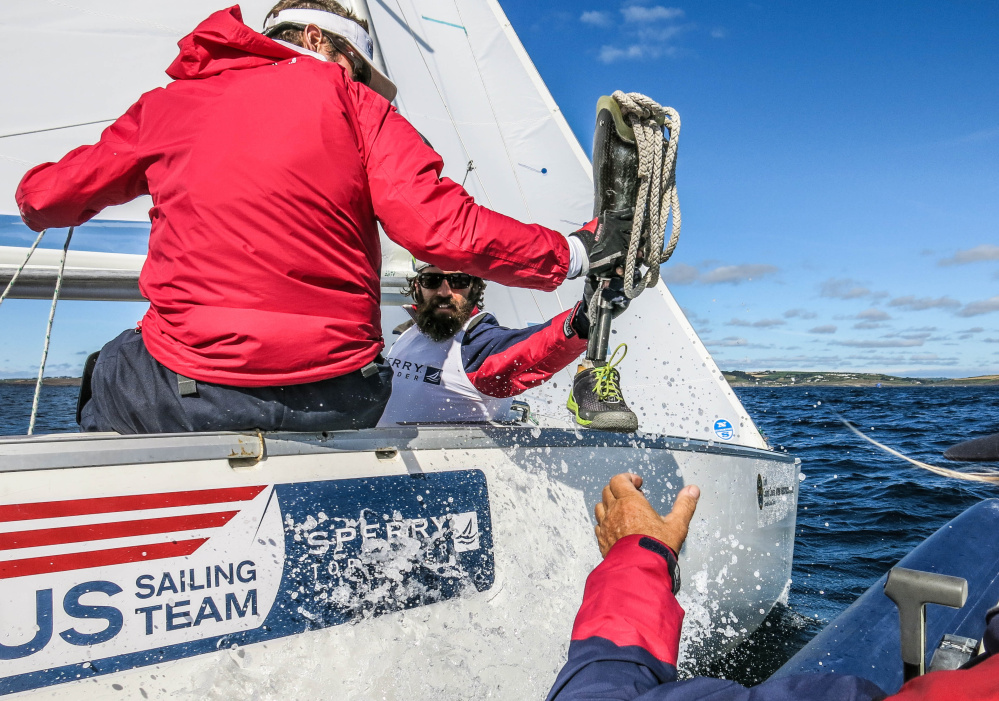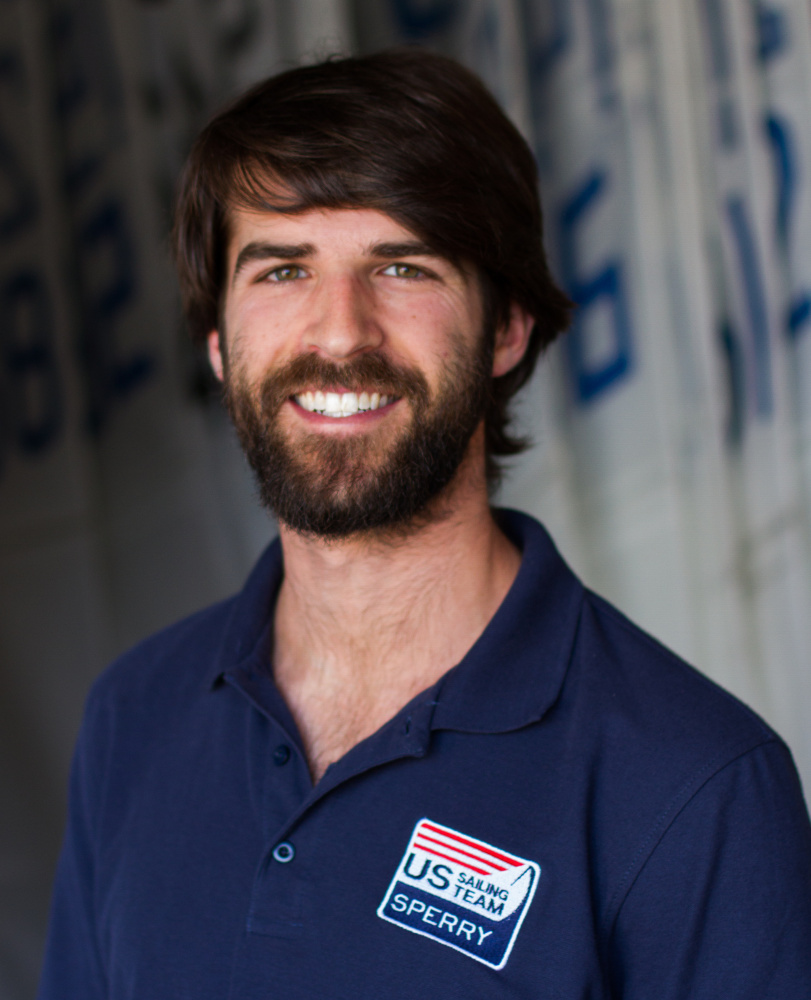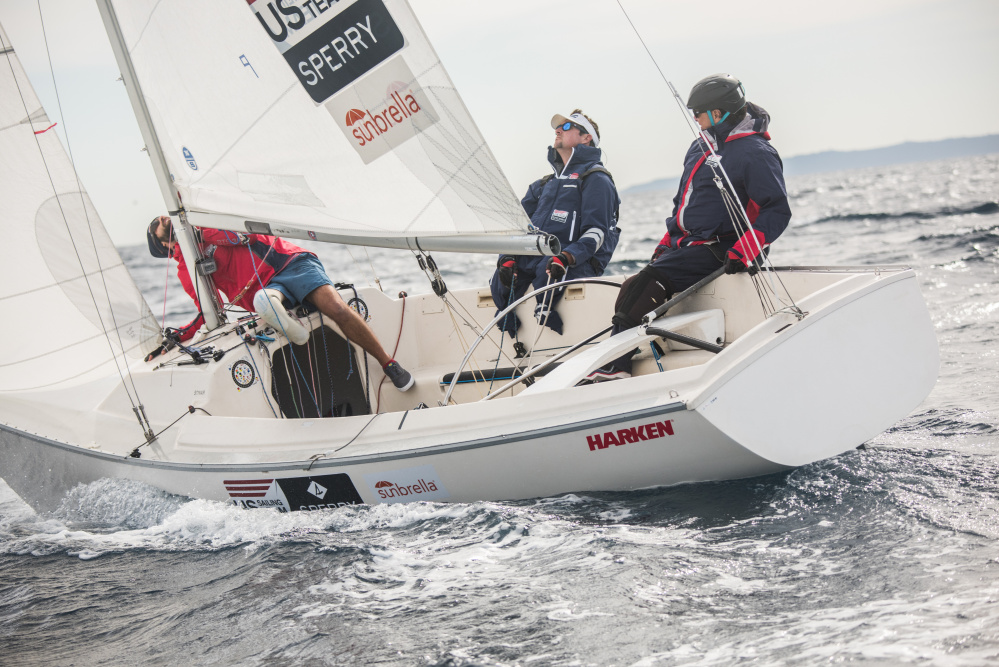Shortly before sailing in his first race Monday in Guanabara Bay at the Rio Paralympics, Hugh Freund will lean over the side of his Sonar keelboat and hand over his foot.
It’s a prosthetic foot, attached to a metal rod. Freund, of South Freeport, has worn it below his right knee since having his lower leg amputated during his first year in college. An aggressive bone cancer revealed itself during a ski trip in 2007.
Now 28, Freund will represent the United States in the three-person Sonar class along with helmsman Rick Doerr of Clifton, New Jersey, and main trimmer/tactician Brad Kendell of Tampa. Freund’s job is to trim the jib.
“There are big challenges in Brazil,” said Freund, who visited Rio twice for training camps this summer before the Paralympics. “The geography is spectacular, but it makes crazy things happen to the wind and even more crazy things happen with the current. It’s one of the most unique and dramatic places I’ve ever sailed.”
Sonar competition features 23-foot keelboats raced by crews from 14 countries. Two-a-day races continue each afternoon until Saturday’s finale concludes the regatta. Paralympics sailing includes two other classes, for one- and two-person boats.
Freund, Doerr and Kendell enter as medal contenders, having won gold at the Para World Sailing Championships in the Netherlands in late May and bronze at a World Cup adaptive event in France in April.
Doerr, with other crew, won the 2007 Para Worlds in Sonar and competed in the 2008 Beijing Paralympics. No sailor, adaptive or not, has been on the U.S. team longer than the veteran skipper, who came aboard in 1998.
“Hugh is always the first one to the boat and the last one to leave,” Doerr said of Freund by email from Rio. “He has an incredible work ethic and pays attention to detail. … He is not the jokester of the team, but he has a quick wit that always catches you off guard.”
Rio marks the first Paralympics for both Freund and Kendell.
“He is very passionate about sailing and always has been,” said Julie Freund about the youngest of her two sons. “He’s an inspiration to all of us. He’s got the whole town of Freeport all abuzz.”
Freund started sailing at 8 at the nearby Harraseeket Yacht Club, where his first coach was Dave Hughes, a Yarmouth native who just sailed in the Men’s 470 Class at the Rio Olympics.
Freund went to high school at Waynflete, where his sports included Nordic skiing in the winter and rowing crew in the fall and spring.
At Roger Williams University in Bristol, Rhode Island, Freund initially hoped to sail and study architecture.
“I quickly learned it’s impossible to do anything along with architecture,” he said. “But I had met the coach and knew everybody on the team.”
It was during winter holiday break at Sugarloaf after one college semester that Freund first felt the effects of osteosarcoma in his right leg.
“People usually discover it either by intense pain in their bones or they end up breaking their bones, because the tumor eats away at bone mass,” he said. “I was lucky because mine was all the way down in the ankle joint, so it was inside the ski boot. All the force from skiing traveled up through the joint and past where the joint was compromised, so I didn’t end up breaking my leg. But the next day it was swollen and funky-looking.”
Initial treatment was for a possible infection, but a biopsy soon revealed cancer. Freund started chemotherapy in February and in March was given the choice of amputation or saving the limb.
He said survival and recovery rates for both options were similar.
“It was purely a quality-of-life decision,” he said. “Keeping the leg would have required more complex surgery because it was near the ankle. I wouldn’t be able to run, to ski, any of that stuff. Amputation seemed like a much better option with (fewer) complications and a far better quality of life.”
Freund took a year off from college as he recovered but returned to Roger Williams for the second semester of 2008. The school’s sailing coach mentioned his name to a colleague at U.S. Sailing, and Doerr, fresh off the Beijing Olympics with a disbanding team, invited Freund to Florida.
“I’m probably well over my head,” Freund told the veteran skipper, “but yeah, I’ll go for it.”
Barely 10 minutes after he got on the boat, Freund broke the thin whisker pole, which fits alongside the boom.
“And nobody seemed too plussed about that,” he said. “I learned pretty quickly that when you race a lot, things break often. You roll with it, figure out how to fix it quickly and when you get back to shore, you make the real repair.”
Throughout the rest of his time in college, Freund balanced sailing and schoolwork and earned his degree in architecture in 2011. Kendell signed on in late 2009 and the trio tried to qualify for the 2012 London Paralympics but missed out by two points.
“Sailing is a weird thing, especially in a three-person boat,” Freund said. “When you have to assemble a team, you look for skills first and then compatibility.”
Paralympic sport has a third component that supersedes the other two, a classification system based on different levels of ability and disability. “So in sailing, our classification is based on numbers, 1 through 7,” Freund said. “A 1 would be severely disabled, like a quad amputee. A 7 is like myself, able-bodied with a below-the-knee prosthetic.”
A three-person crew can add up to no more than 14 points.
“So the first thing people ask is ‘What’s your point value?’ ” he said. “It’s kind of cruel, but it’s open and shut. It’s the currency.”
At 7, Freund gobbles up half his team’s value. Doerr, a high paraplegic with a spinal cord injury from a motor vehicle rollover, is a 3. Kendell, a bilateral above-the-knee amputee from a plane crash, is a 4.
Together, they add up to 14, a combination that has resulted in nine medals at major regattas since they joined forces seven years ago. Each of the three has a full-time job (Freund does Web design for a company in Westbrook) and must pay out-of-pocket for some expenses.
Because of some bureaucratic missteps, sailing will not be part of the 2020 Paralympics in Tokyo, so this may be Freund’s only shot. He aims to make the best of it.
“We’re on a pretty good trajectory going into the Games,” he said. “Eight years from now, who knows where any of us will be. So as a team, it’s our last go.”
Send questions/comments to the editors.





